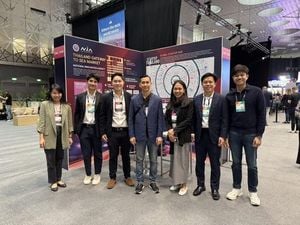Elon Musk has taken legal action against OpenAI, the company he co-founded, seeking to prevent its transition from a non-profit to a fully for-profit organization. This request for judicial intervention arises from the tech mogul’s concerns about potential anti-competitive conduct following OpenAI’s recent shift to what it terms as capped profit.
At the heart of Musk's lawsuit, filed with alarming fervor, is the argument against OpenAI's current governance structure. Initially set up as a non-profit organization, OpenAI has now switched its status to allow for profit, a move Musk argues undermines its foundational objectives. The change enables OpenAI to attract major investments, potentially including those from tech giants like Microsoft and leveraging its strategic relationships to benefit financially.
OpenAI has been associated with hefty financial backers, including Microsoft, which has invested approximately $14 billion. Recently, as business ventures like ChatGPT have garnered massive attention and transformed the AI industry, Musk’s concerns have intensified. He alleges the new profit model runs the risk of prioritizing corporate greed over the altruistic principles upon which OpenAI was founded. “OpenAI should not benefit from wrongfully obtained competitively sensitive information or coordination via the Microsoft-OpenAI board interlocks,” Musk's legal team contends.
According to legal documents presented to the court, Musk alleges OpenAI, under current leadership, is discouraging investments from interested parties toward his competing AI venture, xAI. The crux of Musk's lawsuit is his assertion of anti-competitive practices, which he claims undermine the competitive field, rendering his company’s fundraising endeavors increasingly challenging.
Elon Musk has fought this battle against OpenAI since last year, initiating his initial complaint on the state level before moving it to federal jurisdiction. His motion for preliminary injunction highlights the stakes involved, underlying the contention over OpenAI’s apparent shift from its original mission of advancing AI for public benefit to generating substantial profits.
Funding discussions have become contentious, with Musk's legal representatives claiming OpenAI has leveraged its board's connections to dry up financing options for its competitors. Allegations made within court documents state OpenAI has attempted to secure private capital commitments by placing restrictions on potential investor support for rival companies, including Musk’s own xAI. This strategic maneuvering, Musk's camp argues, effectively stifles competition and severely limits innovation.
OpenAI, defending its actions, has dismissed Musk's claims as baseless. A spokesperson for the organization characterized Musk's assertions as “utterly without merit,” reiteratively dismissing the accusations as rehashed grievances. The firm maintains its focus on enriching AI development ethically and asserts its obligation to adapt to remain competitive.
Musk's suit has prompted intense scrutiny not only on OpenAI but the broader AI industry, as regulators began examining the dynamics between startups and large corporations within this burgeoning field. The moves being made at OpenAI have drawn the eye of the Federal Trade Commission (FTC), which announced earlier this year its intent to investigate the financial partnerships forming within AI-centric organizations.
The litigation encapsulates the cultural clash between Musk's vision for AI—rooted firmly in ethical commitments and non-profit foundations—and the fiercely competitive spirit seen within Silicon Valley, especially as useful AI technologies mount market transformations. With the generative AI market projected to balloon within the next decade, Musk’s push against OpenAI’s operational changes may be framed as not only protecting his interests but ensuring the competitiveness and ethical rigor of future technological advancements.
Both parties may be at loggerheads over how innovation is shaped and who it primarily benefits. If Musk’s legal team gains traction with their arguments, it could reveal insights not just about OpenAI’s operations but about the changing nature and vast potential of the AI industry itself.



